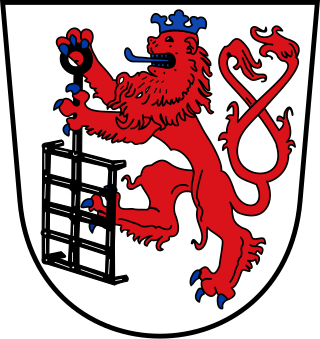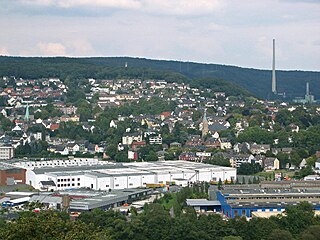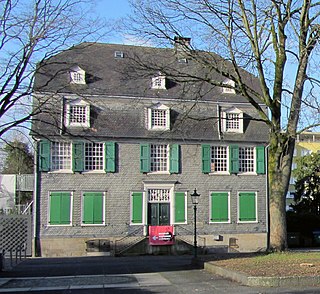
Wuppertal is a city in North Rhine-Westphalia, the most populous state of Germany. With a population of approximately 355,000, Wuppertal is the seventh-largest city in North Rhine-Westphalia as well as the 17th-largest city in Germany. It was founded in 1929 by the merger of the cities and towns of Elberfeld, Barmen, Ronsdorf, Cronenberg and Vohwinkel, and was initially "Barmen-Elberfeld" before adopting its present name in 1930. It is regarded as the capital and largest city of the Bergisches Land.

Bochum is a city in North Rhine-Westphalia. With a population of 372,348, it is the sixth largest city, one of the most populous German federal states of North Rhine-Westphalia, and the 16th largest city of Germany. On the Ruhr Heights (Ruhrhöhen) hill chain, between the rivers Ruhr to the south and Emscher to the north, it is the second largest city of Westphalia after Dortmund, and the fourth largest city of the Ruhr after Dortmund, Essen and Duisburg. It lies at the centre of the Ruhr, Germany's largest urban area, in the Rhine-Ruhr Metropolitan Region, and belongs to the region of Arnsberg. Bochum is the sixth largest and one of the southernmost cities in the Low German dialect area. There are nine institutions of higher education in the city, most notably the Ruhr University Bochum, one of the ten largest universities in Germany, and the Bochum University of Applied Sciences.

The Bergisches Land is a low mountain range in the state of North Rhine-Westphalia, Germany, east of the Rhine and south of the Ruhr. The landscape is shaped by forests, meadows, rivers and creeks and contains over twenty artificial lakes. Wuppertal is the biggest town, while the southern part has economic and socio-cultural ties to Cologne. Wuppertal and the neighbouring cities of Remscheid and Solingen form the Bergisches Städtedreieck.
The Oberbergischer Kreis is a Kreis (district) in the state of North Rhine-Westphalia, Germany. Neighboring districts are Ennepe-Ruhr, Märkischer Kreis, Olpe, Altenkirchen, Rhein-Sieg, Rheinisch-Bergischer Kreis, and the urban districts Remscheid and Wuppertal.

Witten is a city with almost 100,000 inhabitants in the Ennepe-Ruhr-Kreis (district) in North Rhine-Westphalia, Germany.

Elberfeld is a municipal subdivision of the German city of Wuppertal; it was an independent town until 1929.

The Rhine-Ruhr metropolitan region is the largest metropolitan region in Germany, with over ten million inhabitants. A polycentric conurbation with several major urban concentrations, the region covers an area of 7,110 square kilometres (2,750 sq mi), entirely within the federal state of North Rhine-Westphalia. The Rhine-Ruhr metropolitan region spreads from the Ruhr area (Dortmund-Bochum-Essen-Duisburg) in the north to the urban areas of the cities of Mönchengladbach, Düsseldorf, Wuppertal, Leverkusen, Cologne, and Bonn in the south. The location of the Rhine-Ruhr at the heart of the European Blue Banana makes it well connected to other major European cities and metropolitan areas such as the Randstad, the Flemish Diamond and the Frankfurt Rhine Main Region.

Erkrath is a town in the district of Mettmann, in North Rhine-Westphalia, Germany.

Wetter (Ruhr) is a town in western Germany, in the federal state of North Rhine-Westphalia and the district of Ennepe-Ruhr-Kreis. The river Ruhr flows through the urban area, separating the district of Alt-Wetter from the districts of Esborn, Volmarstein and Wengern. The cities of Dortmund and Bochum are within 20 minutes by road or rail.

The Liebig Medal was established by the Association of German Chemists in 1903 to celebrate the centenary of Justus von Liebig. Since 1946 it has been awarded by the Society of German Chemists.
Events in the year 1891 in Germany.

Kemna concentration camp was one of the early Nazi concentration camps, created by the Third Reich to incarcerate their political opponents after the Nazi Party first seized power in 1933. The camp was established in a former factory on the Wupper river in the Kemna neighborhood of the Barmen quarter of Wuppertal. It was run by the SA group in Düsseldorf.
Karl Ibach was a German member of the resistance against the Third Reich and later, a writer and politician.
Oskar Hoffmann was a German editor and politician. He served in the Landtag in North Rhine-Westphalia and was a member of the Social Democratic Party of Germany. After the war, he became a member of the Communist Party. He was arrested in 1933 and for one month, was held at Kemna concentration camp, where he was tortured physically and psychologically.
Wilhelm "Willi" Veller was a German politician and member of the Nazi Party and the SA. As chief of police (Polizeipräsident) in Wuppertal, he oversaw Kemna concentration camp until he was removed from his post. He was later sent to the Eastern Front, where he died fighting in Bredūnai in 1941.

Engels-Haus is a museum in Wuppertal, Germany, located in the house where Friedrich Engels (1820–1895) grew up. The museum is a constituent member of the Museum of Industrial Culture in Wuppertal.











